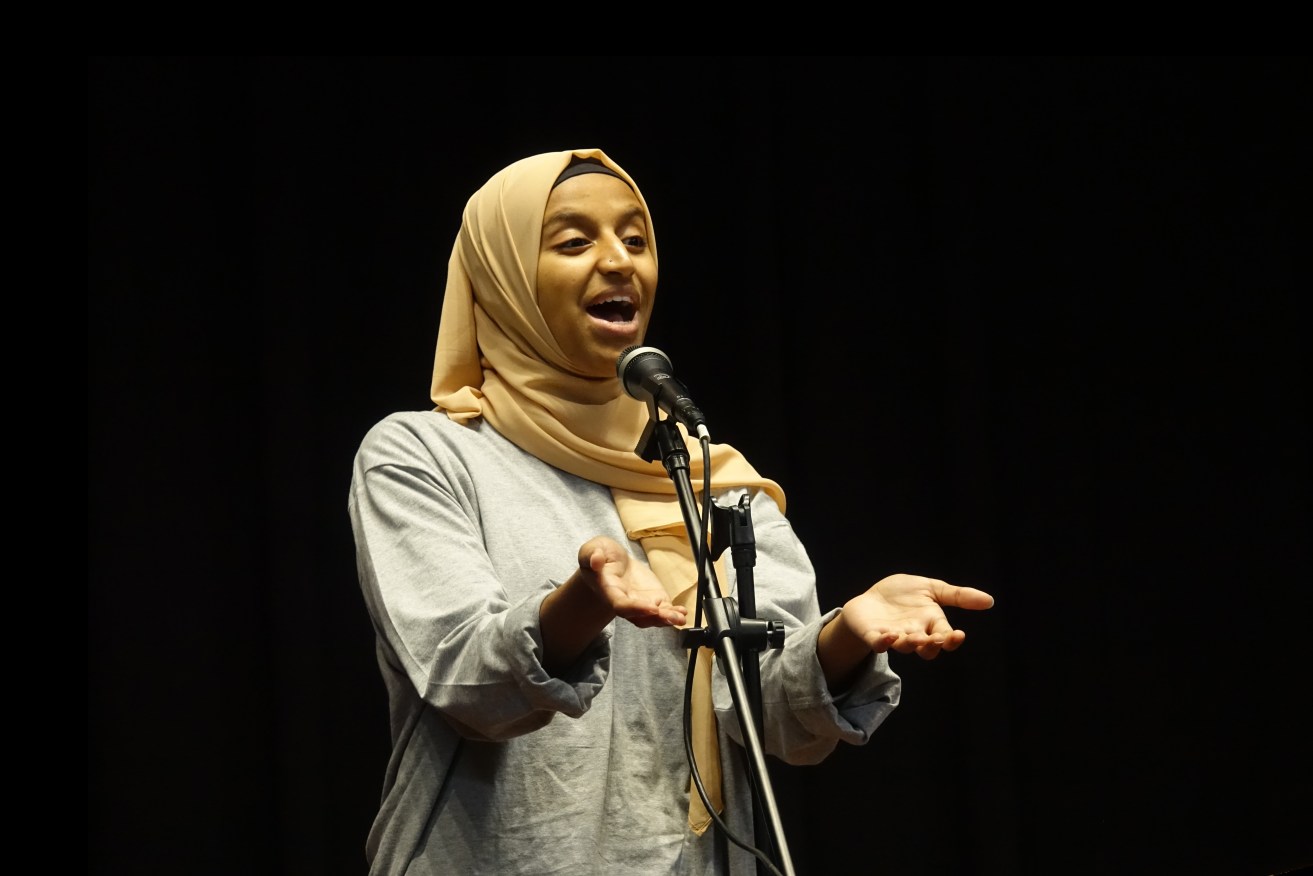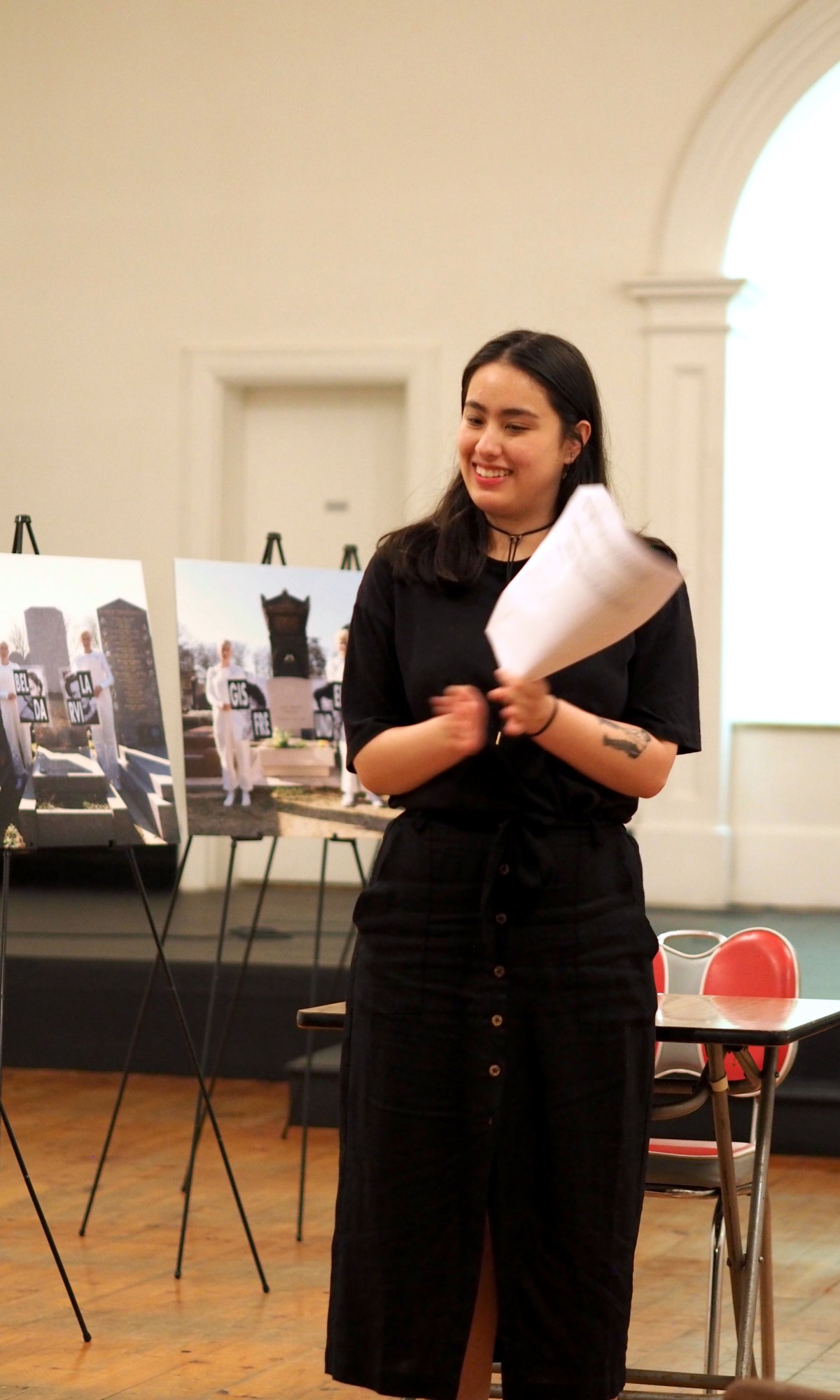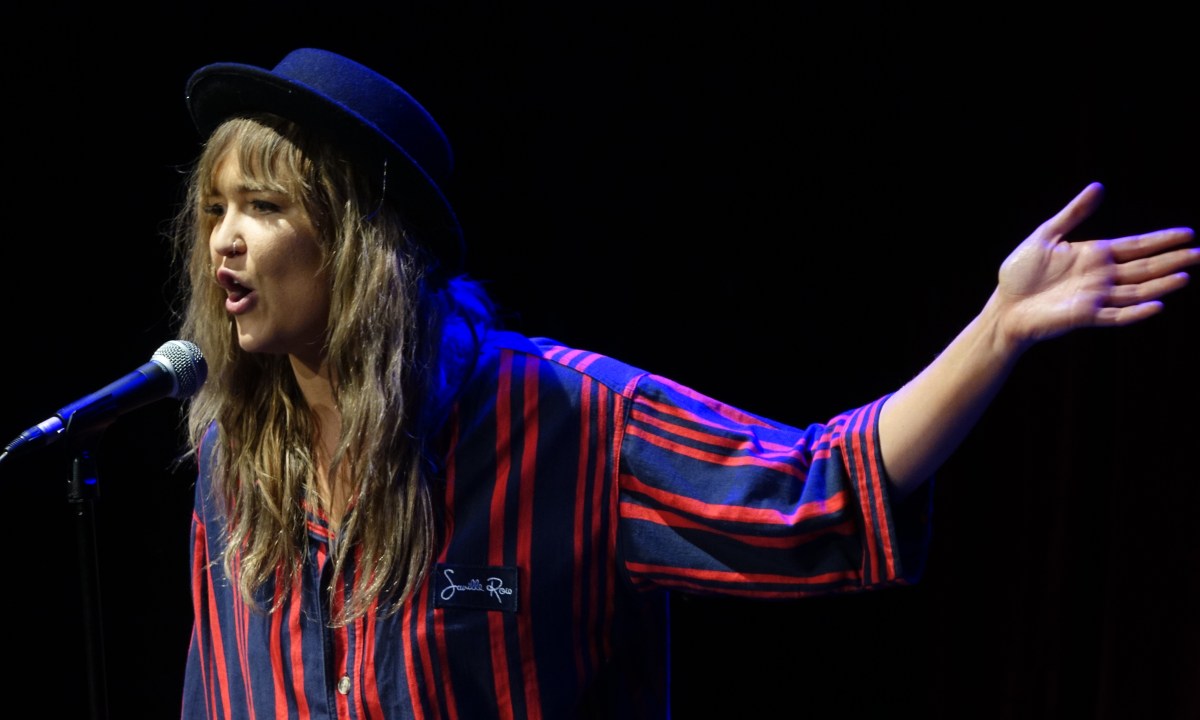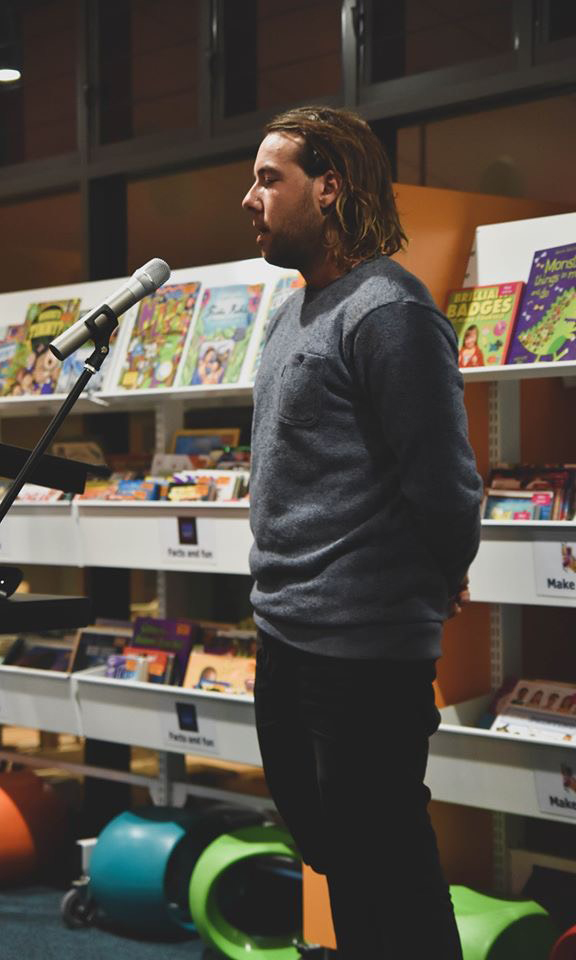SA’s millennial poets thrive by breaking the rules
Some of South Australia’s most promising emerging poets explain why young people are flocking to the art form and smashing traditions in the process.


Manal Younus. Photo: Lucy Corin
Adelaide is in the throes of a poetry renaissance, according to university student and poet Olivia De Zilva.
“I’m not sure how it was 20 years ago, but I know now that there’s more groups formulating around poetry,” she says.
“In our spoken-word poetry community there’s hundreds of different people, which is really, really cool, and they’re really diverse. There’s also slam events around, too.”
De Zilva is co-curator of poetry-reading series NO WAVE, which for the last two years has held monthly events at the Wheatsheaf Hotel where people perform spoken-word poetry.
While some young poets are inspired by the Instapoetry made famous by Rupi Kaur‘s Instagram page, others share their verse through freestyle, haiku or performance poetry, and via different forms of social media such as YouTube.

Olivia De Zilva. Photo: Nicole Wedding
They’re also looking to their community for inspiration.
De Zilva’s NO WAVE event can draw up to 50 people and she believes its growing popularity represents a shift in how participants perceive the discipline.
“People [have] started to take poetry less seriously,” says De Zilva, who describes her verse as casual, conversational and colloquial (read one of her poems at the bottom of this article).
“I started writing my own [poetry] because I realised it doesn’t have to be confined to something that’s super traditional, or super wacky – it can just be anything you want it to be.
“It’s not seen as this austere art form any more, but it’s something everyone can just enjoy.”
NO WAVE is one of many events for spoken-word, performance or page-based poetry in South Australia. The longest-running of these are the Friendly Street Poets collective’s monthly open-mic poetry readings.
There’s also an annual Spring Poetry Festival run by South Australian English teachers to showcase student writers, and Adelaide Writers’ Week this year included a dedicated afternoon of spoken-word and slam poetry, with Writers’ Week director Jo Dyer saying it was “heartening to observe the resurgence of poetry as an artform amongst the young”.
Poet and spokesperson for Spoken Word South Australia (SWSA) Kami McInnes says South Australia has a strong history and community surrounding poetry – Friendly Street Poets has been operating for 44 years – which allows emerging talent to learn from established poets and continue to push boundaries.
“Young artists and artisans are seizing their moment to continue to build,” he says.
“SWSA is a strong, committed group of poets who have a lot to say about the world around them and the way it affects their own lives.
“There is a strong political thread, both personal and on a larger level, running through their work.”
Manal Younus, based in metropolitan Adelaide, is one of South Australia’s most successful young poets.
With explosive passion and wit, Younus’s spoken word and slam poetry – performative poetry relying on expression and inflection – explores themes such as identity and feminism from her perspective as a young Muslim Eritrean woman living in Australia.
In 2015 she released a book of poetry, Reap, and she has also performed at the Sydney Opera House and TEDxAdelaide.
Although Younus is currently on a creative hiatus, she advises young poets to master the form by abandoning assumptions.
“In every workshop that I run, I say that it’s important that we break the rules,” she says.
“But I also teach that there are no rules.
“Once we break away from thinking of these techniques as rules, then we can truly be creative or able to create something that is new that is our own style.”
Younus says emerging voices are varied because of many mediums through which they can perform their poetry.
Social worker Ashlee Karlar writes visceral and comedic spoken and slam poetry to act as “social commentary”. However, rather than only exploring issues close to her – like feminism and queerness – Karlar also draws on her career for inspiration.

Ashlee Karlar. Photo: Lucy Corin
“When I went to the Australian poetry slam, I think in 2017, I used my experience from when my dad had cancer, because he was a low-income earner and had disability pension,” Karlar says.
“I really used the experience of how much different his care was from doctors than it would have been if he was, I guess, a higher-income earner.
“A lot of the stories of the kids that I work with have the same things about the way they’re judged in society and the way people look down on them. I really use that to kind of fuel that poem; it sits close to my heart, seeing this kind of behaviour.”
Karlar also employs poetry and narrative therapy to help her patients work through issues.
“I find them [poems] a really great way to deal with trauma for clients as well, because you can talk in a third person and a lot of clients find that more of a safe way to talk about backgrounds or events.”
Renmark-based civil construction worker Scott Bartholomeus is one of the South Australian poetry scene’s new faces. He has performed at events in metropolitan Adelaide this year, and was a 2019 South Australian Poetry Slam finalist.
He says he disregards conventions when writing, instead trusting his gut when dipping into emotional extremes and writing about nature or identity – such as in his poem below inspired by the River Murray.

Scott Bartholomaeus.
I felt the river missing me she sounded all at sea so I graced her with some company, let her kiss me head to feet, I sang our quiet song she just smiled and sang along, I said it’s been too long my love but I beg for you to know, that I’ll never give you up, you own a pretty peace in me, I love you for you’re free, for a moment we didn’t speak, embracing not to think, with that silence I know she knows that no matter how to and fro we grow there’s no where else We’d rather be, for I am her and she is me, My darling, the Murray
Bartholomeus is also a rapper.
“I’ve had a few rap battles and things like that,” he says. “My uncle and my nana have sort of been pushing me recently, trying to encourage me publish something or do something like that, and then I saw the slam poetry and thought that was perfect for me.”
He envisions eventually relocating to metropolitan Adelaide to attend more poetry slams and open-mic nights such as Spoke N Slurred, run by Paroxysm Press.
Slam and spoken-word poet Emelia Haskey – a regular fixture on the Spoke N Slurred scene – uses her razor-sharp poetry to explore “taboo issues that don’t get as much attention as other issues in our society”.
With immense on-stage confidence and tact, this year’s South Australian Poetry Slam winner tackles issues such as suicide and eating disorders.
She says poetry is her soapbox, as the medium naturally lends itself to experimentation through structure and performance.
“I write a lot of freestyle poetry, which I love because it gives me lots of new ways to work with words, and also to perform as well,” says Haskey.
“You don’t have to just stick to traditional poetry styles like haiku or rhyming poetry. I never perform the same poem the same way – it’s always slightly different every time.”
Haskey says there a growing interest in poetry in Adelaide, and she encourages other young writers to be fearless poets.
Despite being just 18 herself, she says she has plenty of material to draw on: “I’ve actually got quite a lot to talk about.”
Get involved with South Australia’s poetry scene by visiting the webpages for NO WAVE, Spring Poetry Festival, Friendly Street Poets and Paroxysm Press. Head to Writers SA website for more information.
The poem below is by Olivia De Zilva.
wonderland (in only 4 days)
I.
one way to remember you
is by your hands.
those big, textured hands
tanned and struggling under the weight of a silver chain
clasping a pint of beer.
the first time we met
i saw your hands and
the chestnut hair swaying against your neck
in the breeze of an aluminium ceiling fan.
our voices
are lost amongst the frequencies of the
other patrons drinking, flirting, existing
when you say something, i nod my head and laugh
as the beer on your upper lip coalesces with the
sweat of this 48 degree thursday night.
II.
meet me at the front of my house
in your beat up old Ford
you’ve been working all day at the grocery store
one hand on the steering wheel
the other
outside the window
dancing through the twilight breeze
tell me that story again —
the one where you got lost in New York
with the lead-singer of a 90s rock band.
i want you to prick your finger on my fly —
but it’s late now and you have work in the morning.
III.
you’re leaving in two days.
i wish you would fold me up into your pocket
and I can live in the holes of your white t-shirt
that you bought from that punk show you didn’t really like.
IV
i don’t like coffee
or sparkling water
and they taste all the more bitter
when i try to impress you.
i can feel my face contort
as if i swallowed a lemon.
but it’s okay
because it makes you laugh
and your laugh is like that Lou Reed song
where he talks about drinking Sangria in the park.
you sit opposite me,
filling out a personality test
at the Scientology centre on Pulteney street.
I don’t know if this is what romance should feel like,
with aliens and Tom Cruise,
but i feel like we are connected;
if not by proximity
but by the deplorable results of our tests.
irresponsible, malicious and dangerous.
when you drop me home,
i can see your face swimming in the sunset of monday afternoon.
your big hands on the steering wheel.
i wait on the sidewalk for you to turn around
to take me with you
to live forever in the passenger seat of your beat up Ford.
but you are at a red light
and as it turns green,
i see your car disappear across the junction.




